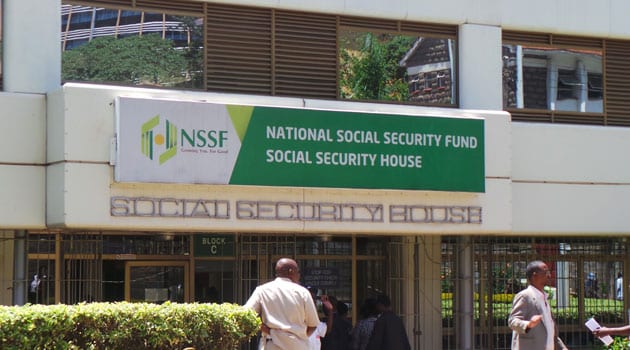Auditor-General exposes financial rot at National Social Security Fund

The latest audit by the Office of the Auditor-General has exposed staggering financial mismanagement at the National Social Security Fund (NSSF), revealing a web of questionable investments, procurement violations, and a lack of internal controls that put billions of shillings at risk.
Covering the financial year ending June 30, 2024, the report raises serious questions about the stewardship of workers’ retirement savings under the state-run pension fund.
Among the most alarming findings is the mishandling of government bond trades. NSSF purchased bonds worth Ksh5 billion at a premium and later sold them at a loss, incurring over Ksh272 million in realised losses.
The Auditor-General noted that management failed to balance capital losses against yield rates, a lapse inconsistent with prudent investment practices expected of a pension fund.
This single episode reflects a broader trend of poor decision-making and lack of oversight.
Lavish spending was also flagged, particularly by the board of trustees, who held 14 full board meetings and nine finance and investment committee meetings—more than double the government-approved limit of six.
These meetings cost the Fund Ksh68.78 million in emoluments, an expense the Auditor-General described as an abuse of governance structures.
The audit uncovered nearly Ksh1 billion in unclaimed or unrecovered tax refunds, with Ksh940.3 million written off due to poor documentation and delayed reconciliations with the Kenya Revenue Authority.
“Management did not provide for audit review evidence of progress made in a refund of the overpaid taxes. In the circumstances, NSSF has not been getting any returns on the long outstanding tax receivables balance of Ksh940,336,114.00,” the report from the Auditor-General’s office said.
Meanwhile, routine purchases raised red flags, including a desktop computer for the reception area bought at an inflated cost of Ksh2.08 million.
Single-sourced conference facilities, irregular travel claims, and unsupported subsistence expenses added up to Ksh317.58 million in questionable spending.
Fuel procurement totalling Ksh51 million was done entirely in cash, bypassing public procurement rules.
Another Ksh410 million went into renovation works acquired through irregular processes, while Ksh1.04 million was spent on the purchase of an eight-bay bulk filer without following laid-down procedures.
The list of infractions paints a picture of systemic disregard for procurement laws.
The Fund’s real estate strategy is equally troubling. Land in Upper Hill purchased for Ksh115 million was found to lack a valid title deed, as it had been revoked—casting doubt on whether any due diligence was conducted.
Valid lease agreements
Several buildings in Nairobi’s CBD were lying idle, generating no income, while others were rented out without valid lease agreements.
An investment property in Kisumu worth Ksh228 million was flagged for irregular operations, though the full details remain under investigation.
Billions are also tied up in non-performing or doubtful investments that include Ksh127 million in underperforming quoted equities, a Ksh38.4 million stake in Consolidated Bank that has lost Ksh209.27 million in value, and exposures to failed financial institutions such as Imperial Bank, Chase Bank, and Real People Microfinance.
NSSF also recorded Ksh946.6 million in provisions for doubtful debts and accrued income unlikely to be collected.
Despite setting a return on investment target of 15 per cent for the year, NSSF only managed to achieve 8 per cent—well below market benchmarks.
The report warns that such poor performance, when coupled with risky investments, could threaten future pension payouts and the Fund’s long-term solvency.
Contributions from members are often delayed in allocation, risking lost earnings for pensioners.
NSSF is also running with a bloated workforce and has failed to recover Ksh1.3 billion in staff loans and Ksh158.3 million in mortgages, most of which are not being serviced.
A Ksh128 million project to build a boundary wall in Bamburi has stalled with no clear explanation.
Further scrutiny revealed two custodial bank accounts holding over Ksh3.5 million operated under an entity not contracted by NSSF—raising concerns over accountability and possible misappropriation.
At the same time, the Fund has accumulated pending bills worth Ksh8.97 million, some dating back over two years, and suffers from poor record-keeping and a lack of transaction reconciliation.
The Fund has accrued pending bills of Ksh8.97 million, with some debts outstanding for over two years.
The audit also cited poor records and a lack of reconciliations for various transactions, underscoring the urgent need for comprehensive financial and administrative reform.
The revelations in the Auditor-General’s report cast a long shadow over NSSF’s stewardship of workers’ retirement savings.
With billions at risk and repeated breaches of the Public Finance Management Act, questions abound over whether the board and management will be held accountable.
The 2024 Auditor General’s report has laid bare a troubling culture of financial recklessness at one of Kenya’s most critical state corporations.
From overpriced desktop computers to billions in non-performing investments and missing tax refunds, the NSSF appears to be in urgent need of a forensic audit and structural overhaul.
Unless swift action is taken, the very purpose of the Fund—to provide financial security for retirees—will remain in jeopardy.
While no official summons has been issued, past precedents suggest that Parliament’s Public Investments Committee may step in.
Civil society and trade unions are also likely to demand accountability, as public confidence in the institution continues to erode.















